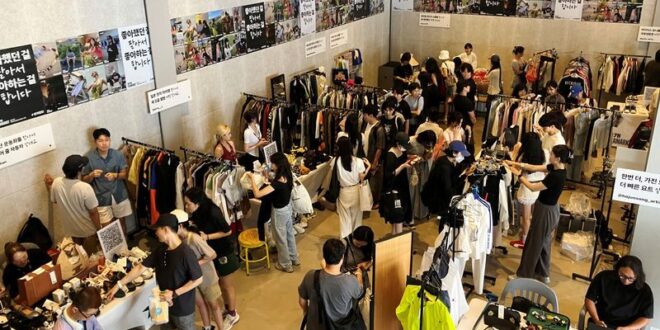SEOUL (Reuters) – As South Korea scrambles to halt the sharp decline in its birth rate, policymakers are having a hard time convincing many in their 20s and 30s that parenthood is a better investment than stylish clothes or fancy restaurants.
Asia’s fourth-largest economy plans to launch a new government ministry dedicated to demographic challenges after years of incentives failed to ease the baby crisis.
But for Park Yeon, a 28-year-old fashion Instagrammer and aspiring singer, spending choices are guided mostly by her appetites for clothing and travel, leaving little budget for marriage and babies.
“I’m all about YOLO (you only live once),” said Park as she sells her Supreme T-shirts at a thrift fashion festival in Seoul’s high-fashion enclave of Seongsu-dong.
“There isn’t enough left to save each month after I do things to reward myself. Getting married might happen at some point but being happy right now – that’s more important, right?”
South Korea continues to break its own record for having the world’s lowest birth rate, which hit a fresh low last year.
Sociologists say the lifestyle priorities of Koreans in their 20s and 30s – considered Generations Y and Z – mean they spend more and save less on average than the wider population or their peers in other countries, neither of which are conducive to nest building.
“They are status hunting. Their high spending habits show young people are working on their own emblems of success online rather than focusing on the impossible goals of settling down and have children,” said Jung Jae-hoon, a sociology professor at Seoul Women’s University.
Not even South Korea’s aggressive interest rate hikes over the past three years have been able to rein in youthful spending.
The savings rate for those in their 30s declined to 28.5% in the first quarter from 29.4% five years ago, while that for all other age groups increased in the same period, central bank data shows.
At the same time, people in their 20s and 30s make up the biggest spenders at department stores and top-tier hotels while their travel spending rose to 40.1% from 33.3% in the past three years.
The proportion of spending by those in their 20s at high-end department stores has almost doubled to 12% in the three years to May, data from Hyundai Card shows, while that for all other age groups declined.
Last year alone, revenue at pricey buffet restaurants jumped 30.3%, versus a gain of 10.5% at fast food restaurants and 9% for the entire dining industry, according to market research firm Euromonitor.
In one example, sales at Seoul Dragon City Hotel – a popular Instagram spot – for its 90,000 won ($68) all-you-can-eat seasonal strawberry dessert jumped 150% from last winter, even after the hotel hiked the price by 12.5%.
In contrast, 25- to 29-year-olds in Australia slashed spending 3.5% in the first quarter of 2024 from a year earlier due to cost-of-living pressure, a report by Commonwealth Bank of Australia shows.
Koreans’ fancy tastes have made them the world’s biggest per-capita spenders on luxury brands, Morgan Stanley’s research showed last year, and a hot destination for the biggest luxury brands.
Chanel, Celine and Dior have all signed deals with teen-focused K-pop groups such as Blackpink and NewJeans as global brand ambassadors.
PLEASURE AND PAIN
To be sure, financial hardship is by far the biggest reason South Koreans cited for not having children, according to a survey by research firm PMI Co. in May.
About 46% of 1,800 respondents blamed either job uncertainty or education costs for this decision.
That’s worsened by annual incomes only rising 2.0% for those in their 20s and 30s last year, slower than the 4.5% increase for all households, according to Statistics Korea.
But Jung added a youth focus on more immediate pleasures also explains why young people don’t respond to the government’s subsidy-based baby boosting policies.
The Yoon Suk Yeol administration in May announced a plan to create a new ministry to focus on demographic issues, after dozens of policy measures including subsidies to reverse vasectomies, cash support for families with newborns, free taxi rides and longer paid childcare leave failed to reverse the plunging birth rates.
In a survey of 17 advanced countries by the U.S. Pew Research Center in 2021 asking what makes life meaningful, South Korea was the only country where material well-being was the top response. Elsewhere, family or health was the top answer.
For Park, having children is an add-on she may consider if her singing career takes off.
“If things work out well with what I do, savings and getting married and all those will follow. For now, enjoying my life and working on my dream job are my priorities,” she said.
($1 = 1,324.2400 won)
(Reporting by Jihoon Lee, Cynthia Kim and Joyce Lee; editing by Sam Holmes)
 BeritaKini.biz Berita Viral Terkini di Malaysia
BeritaKini.biz Berita Viral Terkini di Malaysia





